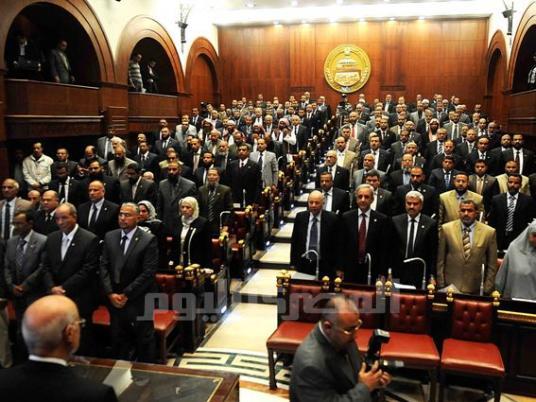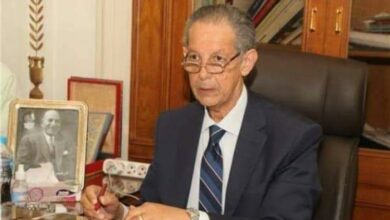
Despite what might be perceived as escalating warning signs to the contrary, the upcoming presidential elections will be the “very model of democracy” — a vow made by Field Marshal Hussein Tantawi on the eve of the much-anticipated announcement of the election dates that reappears as the headline to Al-Ahram’s leading story.
The state-owned paper reports that, in a written letter read by Shura Council Speaker Ahmed Fahmy during the newly elected council’s second session Tuesday, Tantawi pledged the elections will be “marked with integrity.”
The commander of the Supreme Council of Armed Forces then proceeded to congratulate his troops for paving the way for a “fair and democratic” process. He emphasized that in recent months, “the armed forces have become increasingly aware that attempts to sabotage their bond with the people would distract them from restoring the nation’s institutions to their desired capacity, which is why they have instead focused their efforts on rebuilding our legislative institutions and securing these upcoming elections.”
Tantawi’s promises fail to make the headlines in any of the privately owned papers, which continue to grumble about a variety of issues — with the exception of the Muslim Brotherhood’s Freedom and Justice paper, which seems to put great effort in avoiding news of any consequence and instead puts forward an outline for rewriting the constitution.
The Freedom and Justice Party’s creatively titled Freedom and Justice Project proposes that the constitutional committee be comprised of 28 People’s Assembly members, 12 Shura Council members, 30 members of “authorities, unions, government institutions and universities,” and, finally, 30 public figures, “preferably constitution experts.” The FJP’s FJP will be officially presented Saturday during the first joint Parliament session.
Saturday’s session — supposedly centered around the writing of a new constitution — is, in itself, a cause for major concern, as independent paper Al-Tahrir points out. Not only will the session be presided over by Tantawi, it will also be held at the Cairo Conference Center in Nasr City at the field marshal’s request.
The paper’s front-page report states that traditionally the ruler of a nation, whether de facto or through general consensus, has no place in parliamentary sessions, “particularly those regarding the drafting of the constitution.” Furthermore, removing such a quintessentially parliamentary process from within the parliamentary building is “a gross violation of all precedents,” the paper concludes.
Beyond the gathering storm that is the drafting of a new constitution, independent papers’ reports on the elections are tinged with a further sense of apprehension, with Al-Wafd suggesting that “disobedience in the Interior Ministry is exposing presidential candidates to assassination attempts.” In a statement made to the paper, Mohsen Bahnasy, director of the Center for Martyrs’ Rights, explains that recent attacks on likely candidates Amr Moussa and Abdel Moneim Abouel Fotouh could be the start of a “worrying trend” in which “counter-revolutionary forces take advantage of the fact that higher powers within the Interior Ministry are distracted with long-term goals.” These forces aim to “postpone the democracy we are all waiting for, as it is not in their favor,” states Bahnasy.
On the same topic, Al-Tahrir poses the question across its front page: “Why have the presidential candidates not been provided with adequate security?” The corresponding report, however, is limited to condemnations of the attacks by other candidates, such as Khaled Ali, Mohamed Selim al-Awa, and Hamdeen Sabbahi.
Al-Tahrir also raises its eyebrow toward the newly elected Shura Council. During Tuesday’s swearing-in session, 36 of its members disrupted proceedings by adding their own pledge to uphold Islamic Sharia. As with the People’s Assembly before it, the Shura Council elections resulted in a landslide victory for Islamists.
Al-Shorouk provides an update on the massive fight that broke out in front of Cairo University on Monday between students and microbus drivers. Apparently, clashes erupted when students complained about three microbuses parked in front of the university’s main entrance. The paper reports that the drivers responded with violence, angering more than 2,000 students living on campus who then marched to the gate to confront the increasing number of microbus drivers. University security chief Brigadier Tarek Tirana has since announced that “ex-convicts” were directly responsible for instigating the violence, which left 11 students wounded, with one currently in critical condition.
Al-Wafd reports that the case against billionaire Naguib Sawiris for allegedly insulting Islam by retweeting an image of Mickey and Minnie Mouse in Islamic attire has been dismissed by the presiding judge at the Qasr al-Nil courthouse. The paper reports that Sawiris has two similar cases — brought forth by an Islamic lawyer, and a member of Parliament, respectively — still pending in separate courthouses.
Al-Wafd also provides a breakdown by governorate of the “general strike crippling the nation’s judicial institutions.” Following the failure of the Independent Union of Courthouse Employees to meet their agreed-upon demands — mainly salary increases — workers of Egyptian courthouses have refrained from their duties. Al-Wafd’s analysis concludes that legal proceedings in 13 separate governorates were “completely paralyzed” because of the strike.
Finally, British Ambassador to Egypt James Watt has confirmed that Britain has yet to receive any formal response from Egyptian authorities about evidence of former regime members’ illicit gains allegedly stored away in UK bank accounts. According to Al-Tahrir, Watt met with Parliament’s Foreign Affairs Committee on Monday evening to discuss the issue. The British ambassador has since publicly stated that his government has repeatedly offered its full cooperation and support, but that “it seems Egyptian authorities are caught up in preparations for the upcoming elections … we have yet to receive any official response.” He did, however, emphasize that the delay was natural, considering the current situation, and that this should not be seen as a reason “to place blame or criticism on Egyptian authorities.”
Egypt’s papers:
Al-Ahram: Daily, state-run, largest distribution in Egypt
Al-Akhbar: Daily, state-run, second to Al-Ahram in institutional size
Al-Gomhurriya: Daily, state-run
Rose al-Youssef: Daily, state-run
Al-Dostour: Daily, privately owned
Al-Shorouk: Daily, privately owned
Al-Wafd: Daily, published by the liberal Wafd Party
Youm7: Daily, privately owned
Al-Tahrir: Daily, privately owned
Freedom and Justice: Daily, published by the Muslim Brotherhood's Freedom and Justice Party
Sawt al-Umma: Weekly, privately owned
Al-Arabi: Weekly, published by the Nasserist Party
Al-Nour: Official paper of the Salafi Nour Party




